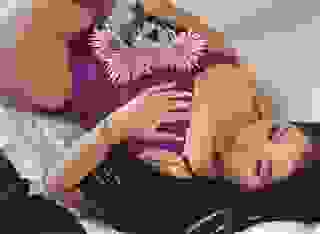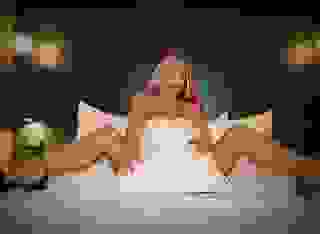- Romance
- The Guerilla Hunter
Note: You can change font size, font face, and turn on dark mode by clicking the "A" icon tab in the Story Info Box.
You can temporarily switch back to a Classic Literotica® experience during our ongoing public Beta testing. Please consider leaving feedback on issues you experience or suggest improvements.
Click hereHoward Barlow's family lived on a twenty acre farm near the tiny town of Posey Hollow, Arkansas, twenty acres in a valley of the Quachita mountains cleared by hand by Howard's father and mother, Enos and Mary, and a team of horses. On that twenty acres, Enos built a cabin and a small barn for the horses and Jewel, their milk cow, using the trees he'd cut down. He also built a small chicken coop for Mary's small flock of chickens.
Enos was a devout believer in the Bible and lived his life according to its teachings. One of those teachings was that no man had a right to own another, and therefore, even if Enos had been able to afford slaves, he would never have had them. When confronted with a difficult task or a problem with his crop, Enos would usually say, "Well, the Lord helps them that help themselves. He don't want any man makin' another do the work when he can do it himself".
Enos knew he was in an area where slavery was a very contested subject. To the North was Southern Missouri and to the South was Southern Arkansas, both areas with landowners who owned slaves and used them to become wealthy. As a result, Enos avoided speaking to anyone other than Mary and Howard about slavery.
That was easy enough to do since the chores of the farm kept the family at home except for Sundays. On Sunday, Enos would hitch the horses to his farm wagon and drive the family the five miles to the little church in Posey Hollow. There usually wouldn't be any conversation about slaves or slavery because the church members were all like Enos -- poor farmers who believed the same way he did. They couldn't afford to pay a preacher, so each man took turns preaching the sermon on Sunday. That made for a very tight-knit community with the church at its center.
Such was the way Howard grew up and how he was taught to respect all men. He was happy helping Enos clear more land until they had forty acres. Enos said that extra twenty acres was for Howard and his wife to settle on. When Howard turned seventeen, he was beginning to look at the young girls who attended the church in Posey Hollow. There weren't many, just four, but there were only four boys his age too, so he figured he had a good chance of convincing one of them to marry him.
Those plans came to a halt in 1859 following John Brown's raid in Virginia. The response by the Governor of Arkansas was to reactivate the Arkansas Militia which had been mostly inactive since the war with Mexico. His purpose was not to join the Confederacy but to prevent Union troops from attacking Arkansas and imposing Federal law in opposition to what he considered to be powers given to the states.
Howard turned eighteen in January of 1861 and was required to serve in the militia. He was just out of training when in May, 1861 Arkansas seceded from the union. The Arkansas Militia became The Provisional Army of Arkansas, and Howard was assigned to the First Division of The Army of Arkansas. His understanding at the time of the change was that The Army of Arkansas would be used to keep the Union troops from interfering with the affairs of the State of Arkansas, but in July of 1861, that changed as well. All units of the Army of Arkansas were to be transferred to the Confederate Army.
All the units of The Army of Arkansas were changed to Confederate Army units except the First Division because of timing. At the time they should have changed, the First Divison was fighting the Battle of Wilson's Creek in Missouri. After the battle, the men of the First Division took a vote and declined to join the Confederate Army. The First Division was then disbanded and the men went home.
It was clear to Howard as he made his way back to Posey Hollow that there could be no neutrals in the forthcoming war. Emotions on both sides were running too high, and loosely organized bands of men who considered themselves to be part of the Confederacy were beginning to harass any people who were neutral or Union Sympathizers.
The only hope was to fight for what he believed and hope the Union won. To that end, he spent the winter with Enos and Mary, and when spring came, he started walking to Springfield, Missouri where the Union was forming a cavalry unit. He thought that tucked away in Posey Hollow, his parents would be safe.
It took Howard a month to reach Springfield, but once he was there, he was mustered into the First Arkansas Cavalry. Their mission was to put down the guerilla fighters who were robbing and killing the people of Arkansas, Kansas and Missouri. Often it didn't mean those people were Union sympathizers. The guerilla fighters were more common thieves and murderers than soldiers and sometimes attacked the farms of people who supported the Confederacy or just wanted to be left alone.
They were also very difficult to catch. Most had grown up in the wilds of Arkansas or at least on farms, and like Howard, knew how to hunt, how to move through the country without being seen, and where there were caves or remote valleys in which they could hide. Howard used the same skills to find them, and by the end of the war was wearing the insignia of a sergeant on his uniform and was leading patrols searching for the guerillas.
It troubled him that in his three years in the cavalry he'd not received many letters from home. He knew that because of the way the First Arkansas cavalry roamed over Arkansas, Kansas, and Southern Missouri it was difficult for the Union to keep up with where they were. If they were assigned to a specific area for a month, the letters would usually catch up to him, though they were often months old.
The letters would tell him everything was going fine on the farm and that Betty Jean Morris often asked about him at church. Howard took comfort in the letters he received and they reassured him he'd made the right decision. At the end of the war though, such extended assignments became fewer and fewer to the point that he hadn't received a letter since Christmas. He only hoped his mother and father received the letters he returned so they wouldn't worry about him.
In August of 1865 the First Arkansas Cavalry was mustered out at Fayetteville. When he received his back pay, Howard knew he would be walking home. All Cavalry horses were the property of the Union and were taken from all units. He also knew there were still guerillas roaming through Arkansas and Missouri who hadn't acknowledged the end of the war. A man wearing a Union uniform would be shot on sight. Because of this, he used some of his pay to purchase a Spencer rifle and a hundred cartridges, and a Remington.44 caliber revolver, powder, balls, and caps. Both were being sold by the Union as surplus and were weapons he'd carried during the later stages of the war.
It took Howard three weeks to walk from Fayetteville to Posey Hollow, and he was careful not to walk on any roads. Instead he struck out across country, following the same map he'd used as a sergeant to guide the troops under his command on patrols in search of guerillas. Twice he came upon a camp of men dressed in the typical flamboyant dress common to the guerillas. Both times he spotted the camp before he was seen, and quietly skirted it. He'd had enough of fighting.
It was a Sunday morning when he found the road to Posey Hollow, and knowing his parents would be in church, he went to the church instead of to the farm. His plan was to wait outside the church until the service was over, and then walk up to his mother and father. Maybe he'd say hello to Betty Jean too.
When he rounded the bend in the dirt road and saw the site of the church, the only thing there was the burned out skeleton of the building lying on the ground. Evidently there had been a fire, probably caused by the old stove used to warm the church a little on winter Sundays. The chimney had been in bad shape when Howard left and with no young men to help fix it, had probably set the roof on fire. Once the fire started, there wouldn't have been any way to put it out because there was no source of water within a mile of the church.
He was sure as soon as the men returned from the war the church would be rebuilt. He was planning on how he would help when he looked at the cemetery beside where the church had stood. He saw the mounds of ten new graves. Maybe the church had caught fire during the service and some of the older folks hadn't made it out.
Howard walked into the cemetery and began reading the names painted on the wood grave markers.
James McCain
Eleanor McCain
Thadeus Ruby
Gladys Ruby
Howard stopped then because the next wood marker read "William Morris". William Morris was Betty Jean's father and young enough he would have been helping people escape the fire. He continued walking down the row of graves then and a fear of what he saw next caused a chill to run down his back.
Mary Morris
Betty Jean Morris
Timothy Alexander Morris
The McCain's and the Ruby's were older folks and might have passed just from old age. If the entire Morris family had died, it wasn't from any fire. There had to be another reason, a reason he didn't understand yet, but he would find out. About thirty people went to that church and someone had to know what happened. He thought surely his father would know.
When he read the grave markers on the last two graves, that thought evaporated. The markers were for Enos Ishmael Barlow and Mary Elizabeth Barlow, Howard's mother and father.
For a while, Howard stood there in disbelief with tears running down his cheeks. They couldn't be dead. They'd written letters to him and said they were fine. Then, Howard remembered it had been six months since he'd gotten a letter from them. He'd told himself that was because he'd moved around so much their letters hadn't caught up with him. Now, he understood he hadn't gotten any letters because his mother and father hadn't been alive to write them.
His first thought then was to go to the farm, but then decided the farm could wait. He had to know what had happened.
In the other direction down the road was the farm of Mason Williams. Mason didn't attend church regularly. His wife Agatha usually only managed to get him there at Christmas and Easter, but she was there every Sunday. One of them would know what had happened to his mother and father.
When Howard walked down the lane to the Williams farm, he saw Mason repairing a fence he used to keep in his milk cow, though Howard didn't see any cow in the pasture. He walked over and said, "Mr. Williams, I don't know if you remember me or not, but I'm Howard Barlow, Enos Barlow's son."
Mason looked up from the rail he was fitting into the post, let the rail fall to the ground and walked over to Howard. He nodded.
"I remember you Howard. You been home yet?"
Howard shook his head.
"No. I stopped off at the church first."
Mason frowned.
"Then you already know 'bout your folks. Wasn't anything they done wrong, Howard. It was a bunch of hooligans who done it. Said they was Confederates but we seen Confederate soldiers in Posey Hollow before and they didn't look like this bunch. They was wearin' fancy shirts and wearin' pistols and was all ridin' horses, not carryin' rifles and walkin'.
"When they come here, they'd already been to your folks place and to the Morris farm. They said they asked Enos if he was for slaves or not. Well, you know your pa. He said it weren't right for a man to keep slaves and told 'em you were off fightin' for the Union so Arkansas wouldn't be a slave state no more. That's when they shot him in the chest. Your ma ran out of the house with your pa's shotgun, but they shot her afore she could use it. Said if she hadn't been trying to shoot 'em, they'd have entertained her first. That's what they said -- entertained her.
"From there they went to the Morris farm and asked him the same question. What William told 'em was he didn't care one way or t'other, but he'd never own slaves himself. I guess that was enough because they shot him and Timothy too. From what me and Agatha found, I think they did like they said with Mary and Betty before they shot them too.
"When they come here, they told me all that. Then, they asked me if I was for slaves or not, and, Lord forgive me, I said men who could afford them should be able to have them. After they told me what they'd done I thought it was the only way I could protect Agatha. You know I ain't a religious man like your pa, but me and Agatha, we been prayin' every morning and every night for the Lord to forgive us for bein' selfish and savin' ourselves.
"Well, after I said that, the leader of the bunch -- called himself Red -- he says if I believed that, then I'd not mind donating my milk cow to the cause. They slaughtered Florence right there in the pasture, cut her up and hauled her away. I 'spect they went and burnt the church after that. They said the church was full of Unionists and they was gonna burn it down afore they left.
"The next day, I found out they'd been to other farms too. James Anderson come by with the McCain's and the Ruby's in his wagon and headin' for the cemetery. When I told him about what those hooligans said about the Morris family and your folks, he said he'd go to the church and start diggin' if I'd go see about them. Me and Agatha took the wagon to the Morris farm and found the family dead on the porch. We put 'em in the wagon and then went to your folk's farm and found 'em and put 'em in my wagon too. Then we went back to the church and helped James bury all of them.
"Howard, we done the best we could with 'em. Amos Crowder made their coffins and markers from wood from his sawmill, and Samuel Parks said the Twenty Third Psalm over 'em and all that. When this thing finally settles down, the men of Posey Hollow are gonna build a new church and we'll get proper grave stones for 'em. Until then, we're all afraid them men might come back. Since the Union stopped chasin' them hooligans, they pretty much can go where they want to go and do what they want to do."
As Howard walked toward his family farm, he wasn't shedding tears. He'd done that at the cemetery. Now, he was raging inside, raging at men who used the war to satisfy some blood lust or to take what didn't belong to them.
What Mason said about the Union not trying to root out the rot left over from the Confederacy was true. In theory, the guerilla bands were still wanted, but the Union was tired of war and was concentrating on putting the Union and the South back together again. There was no stomach for hunting down the few men who still roamed Arkansas, Missouri, Kansas and Texas and robbed and killed people who had done nothing except hold some personal beliefs.
There were also sentiments among some in the Union that Kansas and Missouri had made the guerillas so it was now up to them to stop them. Howard knew that wasn't going to happen. In many ways, the states that had seceded were being punished and had little resources available to track down the guerillas..
Howard was still mulling this over in his mind when he walked up the lane to the cabin where he grew up. Another reason the Union had stopped trying to find the guerillas was the main bands, including their leaders, had already been caught or killed. Those that had escaped had formed smaller bands, sometimes only three or four men. It was a lot easier to find a group of twenty or more. They left wide, easy to follow trails, and the places they could hide were fewer. It was difficult to track so few and there were more places for them to hide.
When he came to the cabin and barn, Howard was surprised to see them still standing. He was even more surprised to see Jewel quietly grazing in the pasture. Evidently the guerillas hadn't seen her.
He looked for Mike and Joe, his father's two horses, and found them down by the creek half a mile from the barn. That's where they liked to spend their days when they weren't pulling a plow or the wagon, so the guerillas had missed them as well. Both horses and Jewel looked thin, probably because they'd gone through the winter without much to eat besides the dry grass in the pastures, but they were alive. He'd have to let one pasture grow into hay and put it up for the winter and he'd have to buy some corn to get the weight back on them, but by spring, the horses would be ready to work and Jewel would be ready to breed again.
When he walked into the cabin, all Howard's ideas for the future were shattered. The cabin was still standing, but that was about all. The inside had been ravaged. All the furniture was broken up and his mother's few pots and pans had been crushed or sported bullet holes. The blankets were gone from the beds and all the clothing that had been in chests was also gone. The guerillas had taken everything of use and destroyed everything else.
When Howard had seen the horses and Jewel, his rage had partially turned to hope. Now, that hope was gone. The guerillas had destroyed most of what he'd lived to come back to. As he sat on the floor in front of the pile of broken dishes and cups, his rage became a quiet resolve.
The guerillas had to pay, had to pay for what they'd done to Posey Hollow and to countless other families in Arkansas, Missouri, Kansas and Texas. If the states couldn't police themselves, he would do that for them. He knew how the guerillas operated, where they were likely to go when not robbing, raping, and killing. He knew some of them by name and others by their faces. Just as it was easier for a group of cavalry to chase down and apprehend a large group of guerillas, it would be easier for one man to hunt down and bring a small group to justice. One man wouldn't make as much noise, and one man wouldn't need a supply train following him with food and ammunition.
The next morning, Howard caught the two horses and harnessed them, caught Jewel and put a rope around her horns, and by riding Mike and leading Joe and Jewel, he went to the Williams farm. Mason was still working on his fence, and stopped when Howard rode up.
"Mornin' Howard. I see them hooligans didn't get your stock."
Howard got down off Mike, and led Jewel over to the fence.
"Mr. Williams, I don't have anything left at the farm to pay you for taking care of my folks. Jewel here is in pretty bad shape, but once she gets the meat back on her bones she'll still make you a milk cow to replace the one the guerillas took. I need a riding horse and a saddle. Is there anybody who still has a decent riding horse they'd part with? I'd trade Mike and Joe here for one good horse and one good saddle and bridle."
Mason took off his hat, scratched his head, then put his hat back on.
"You might go see Benjamin Phelps. He come here from Texas where he worked on a cattle ranch and he likes his horses. His farm is way up the valley and as far as I know, them hooligans didn't bother him yet. I know he had a couple of geldings he rode to Posey Hollow sometimes. Whatcha gonna do with a ridin' horse?"
Mason saw the firm line of Howard's mouth when he answered.
"I'm going to do what I did in the cavalry. I'm going to make those guerillas pay for what they did in Posey Hollow and other places."
Mason shook his head.
"Young feller, I ain't read much of the Bible, but I do know the Good Lord said vengeance was for him. I don't expect anything for taking care of your folks for you. It was just something people do for one another. Take your horses and cow and go back to farming. Leave them hooligans to someone else."
Howard smiled.
"It isn't vengeance to bring guilty people to justice. They're the ones who sinned. I'll just be making sure they pay the price. I think God would agree with me on that."
When Howard got to the Phelps farm, he saw six horses in the pasture beside the barn. Two were heavy work horses like Mike and Joe. The other four were a little shorter and not as heavy. The one that caught his eye was a bay gelding with a black mane and tail. He'd ridden a bay with a black mane and tail in the Cavalry.








